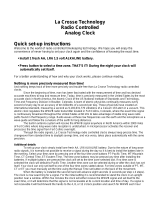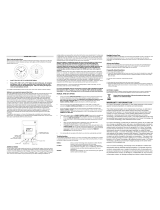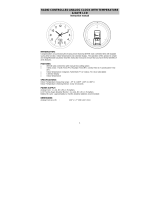Page is loading ...

Model 28600
Quick set up instructions:
Welcome to the world of radio controlled timekeeping technology. We hope you will
enjoy the convenience of never having to set your clock again and the confidence of
knowing exactly what time it is.
Insert 1 fresh AA, LR6 1.5 volt ALKALINE battery according to the polarity marked on
the case
Place the clock in a window overnight with the face of the clock pointing toward
Colorado. Allow the clock to set itself to Pacific time before pressing any buttons. If the
clock does not set overnight, allow it another night to set itself. Poor weather or
atmospheric disturbance can interfere with the clock picking up the signal.
If you do not live in the Pacific time zone, then press the button to select your time zone.
THAT'S IT!

Note: When the battery is installed the second hand will advance eight seconds (two
seconds per step x four steps).
The clock is now searching for a signal. For the initial setting it is recommended to stand
the clock in an upright position near a window. Within five minutes the clock will either
receive the WWVB signal and set itself to the exact time, or it will determine that the
signal is not receivable at its current location and time of day. If a signal is not receivable
it will fast-forward the hands to the 4, 8, or 12 o'clock position and search for WWVB
each hour until a signal is received. If the time is manually set the clock will continue to
periodically search for a signal and automatically reset the hands when the signal
is received.
For a better understanding of how and why your
clock works please continue reading.
Nothing is more precisely measured than time!
Since the beginning of time, man has been fascinated with the measurement of time and
has devised more accurate machines to trap and measure time. Today, time is precisely
measured in the United States by the most accurate clock in North America, the Atomic
Clock of the US National Institute of Standards and Technology, Time and Frequency
Division in Boulder, Colorado. A team of atomic physicists continually measures every
second of every day to an accuracy of ten billionths of a second per day. These physicists
have created an international standard, measuring a second as 9,192,631,770 vibrations of
a Cesium 133 atom in a vacuum. This atomic clock regulates the WWVB radio
transmitter located in Fort Collins, Colorado, where the exact time signal is continuously
broadcast throughout the United States at 60 kHz to take advantage of stable longwave
radio paths found in that frequency range. Radio waves at these low frequencies use the
earth and the ionosphere as a wave-guide and follow the curvature of the earth for long
distances.
The built in antenna system will receive the WWVB signal anywhere in North America
within 2000 miles of Fort Collins where long-wave radio reception is undisturbed. A
microprocessor activates the receiver and processes the time signal from Fort Collins
overnight.
Through the radio signals, Skyscan radio controlled clocks always keep precise time. The
changeover from standard time to daylight savings time, and vice versa, takes place
automatically with the same precision.

Additional details:
To set up your clock simply install one fresh AA, LR6 ALKALINE battery. Due to the
nature of long wave radio signals it is normally not possible to receive a signal during the
day so it is best to install the battery late in the evening. Select your time zone by
pressing one of the four time zone buttons
PT-Pacific Time
MT-Mountain Time
CT-Central Time
ET-Eastern Time
If no time zone is selected the clock will default to Pacific Time. Another time zone can
be selected after the clock has set itself. Your clock can only set itself to one of the four
time zones stated above. For time zones outside of PT, MT, CT or ET you must manually
set the time using the Manual Time set button on the back of the movement.
Select a location to place your radio controlled clock here it will be at least six feet away
from a TV, computer, air conditioner or other household electrical appliances. The
optimal location is near a window. Windows facing Colorado provide the best signal. The
WWVB time signal will easily penetrate masonry and wood framed buildings. WWVB
will penetrate almost every residential building and most steel buildings if they have
adequate windows. It is not possible, however, for WWVB to penetrate most indoor
shopping malls and rooms in the center of large office buildings that do not have
windows. In buildings that WWVB cannot penetrate you may set the time using the
manual time set button. When the clock is exposed to the WWVB signal it will
automatically set the hands to the exact time.

Skyscan clocks do not receive or process radio controlled time signals from Germany's
DCF 77, Japan's J Ga AS, or England's MSFs atomically regulated transmitters. Skyscan
clocks can be manually set and used anywhere.
For more information on the NIST and radio controlled time, see
www.boulder.nist.gov/timefreq/
Set the time using the Manual Time Set button:
In some cases, the Skyscan clock may not receive the WWVB signal due to atmospheric
disturbances or hard to reach locations such as inside malls. In this case, please use the
Manual Time Set button, located at the back of the clock to manually set the time. To do
this:
1. Press and hold the Manual Set button.
2. The minutes and seconds hands will fast-forward. The seconds' hand will stop at 12.
The minute's hand will keep advancing.
3. Keep holding the Manual Set button until the time is set as required.
4. Release the button.
Note:
The clock will continuously search for WWVB each hour until a signal is received. Once
the WWVB time signal is received, the WWVB time will override the manual set time.

Troubleshooting
The wonderful advantage of owning a Skyscan radio controlled clock is that it is virtually
trouble free. If the clock receives a clear signal it will set itself perfectly. If it does not
receive a signal consider the following:
Battery - The Skyscan clock must have a fresh battery to receive and process the time
signal.
Location - Try a different location, ideally near a window. It should be at least six feet
from computers, TVs, air conditioners, other Radio-Controlled clocks and other electrical
appliances that cause interference.
Weather - Electrical storms between you and Colorado during the night will interfere
with the WWVB signal.
Daylight Savings Time
The National Institute of Standards and Technology and WWVB encode a special DST
"bit" in the WWVB transmission for DST. Your Skyscan clock will read this information
and automatically advance the hands one hour in the spring and eleven hours in the fall.
Arizona and Indiana
If you live in an area that does not recognize DST you must press the (unmarked) DST
button for one second to deactivate your clock's DST program. To reactivate the DST
program simply press the DST button again for one second.

Frequently Asked Questions
Q. How long will the battery last?
A. A good AA alkaline battery will last over one year. If your clock is located in an area
with little interference where it can quickly receive a signal the battery will last much
longer than one year.
Q. Can the clock be wired to control timing circuits?
A. No.
Q. Why does the second hand move only once every two seconds, but it moves two
seconds per step?
A. When the battery drops below 1.25 volts the clock indicates that it is time to change
the battery by advancing the second hand in two second steps. The operating voltage
range is 1.25 to 1.75 volts.
WARRANTY:
This product is warranted to be free of defects in manufacturing for 1 year after purchase
from Sam’s Club.
This model is discontinued and no longer eligible for the manufacturer’s warranty.
Defective clocks should be returned to the place of retail purchase.
BATTERIES CHANGE:
For best performance, batteries should be replaced at least once a year to maintain the
best running accuracy. Ensure that the batteries used are new and the correct size.
Please help in the preservation of the environment and return used batteries to an
authorized depot.
/






